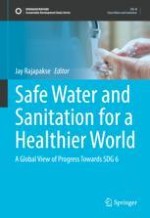2022 | OriginalPaper | Chapter
2. The Objectives of Sustainable Development of Water and Sanitation in Latin America
Authors : Teofilo Carlos N. Monteiro, Hildegarde Venero, Rosa M. Alcayhuman, Rodrigo Coelho de Carvalho
Published in: Safe Water and Sanitation for a Healthier World
Publisher: Springer International Publishing
Activate our intelligent search to find suitable subject content or patents.
Select sections of text to find matching patents with Artificial Intelligence. powered by
Select sections of text to find additional relevant content using AI-assisted search. powered by
